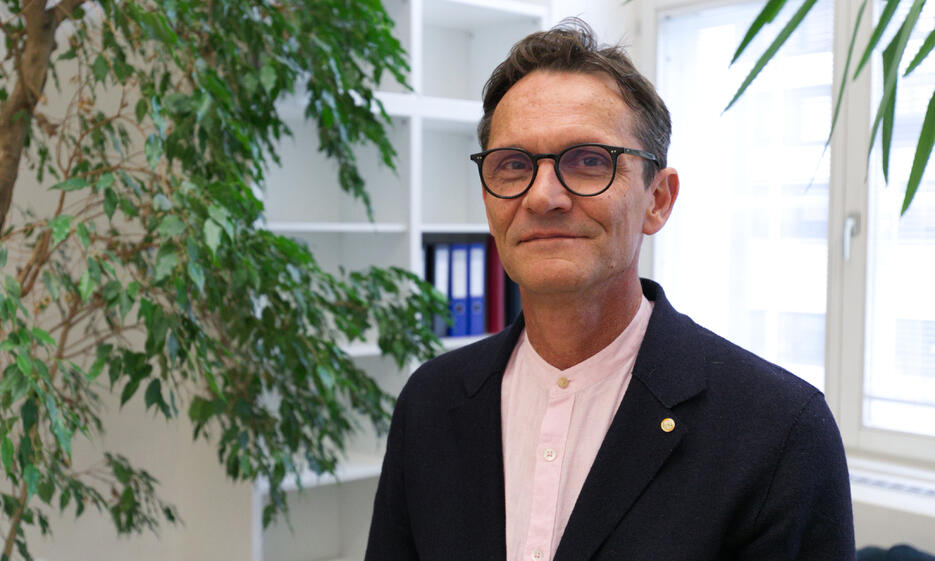What’s new for the students at the University of Innsbruck in the new academic year?
In addition to five new Master’s Programmes (MA Pharmaceutical Sciences, MA Electrical Engineering, MA Antique Worlds, MA Philosophy of Religion, MA Peace and Conflict Studies), a specific feature at the University of Innsbruck has been expanded: our Minors. A further nine Minors allow our students to individualise their study programmes even more:
- Minor Culture and Management in Context
- Minor Classics
- Minor Methods of Empirical Language Analysis
- Minor Medieval Studies
- Minor Communicative Skills for the Profession
- Minor Language – Space - Society
- Minor Translation: Translating and Interpreting
- Minor Comparative Literature: Literature – Culture - Media
- Minor Eastern European Studies
Can every student choose completely freely from all the Minors?
At https://www.uibk.ac.at/studium/angebot/zusatzangebot/ you can find all Minors and further information. Some Minors are only possible with an active bachelor’s programme, others only with an active master’s programme. The Minor “Digital Science” is an exception, it can be selected by bachelor’s as well as master’s students. In some exceptional cases there are also further limitations that are listed on the website, but basically every Minor of interest can be passed. Students may not pass a Minor that is too closely related to their study programme, because the Minors aim is at looking further beyond the student’s specific study programme.
Is a Minor part of my study programme or an optional extra?
A Minor is part of the study programme, providing the curriculum of the study programme includes a Minor. In such a case, the fully passed Minor will be listed in the final degree certificate and in the diploma supplement. If the study programme’s curriculum does not provide the opportunity to pass a Minor, then the Minor is an extra. In this case, the courses passed will of course be listed in the diploma supplement.
What is the difference between a Minor, the Individual Choice of Specialisation and the module Interdisciplinary Skills?
The module Interdisciplinary Skills allows the selection of individual courses from other curricula at the same level of study at the University of Innsbruck, i.e. in the case of a bachelor’s programme courses from other bachelor curricula and in the case of a master’s programme courses from other master curricula. Usually, this module covers up to 10 ECTS-Credits.
In an Individual Choice of Specialisation whole modules from other curricula at the same level of study rather than individual courses can be selected. Usually up to 20 ECTS-Credits.
Instead of a more or less colourfully mixed Individual Choice of Specialisation and the module Interdisciplinary Skills, a specific Minor, usually covering up to 30 ECTS-Credits may be passed.
All this freedom in the design of study programmes allows for the so-called window of opportunity, as long as it is anchored in the respective curriculum. Of course, this window of opportunity can also be used wonderfully for a semester abroad.
Individual Choice of Specialisation, Minors, maybe a semester abroad – there are so many opportunities to design my study programme. Can I get help for doing so?
Of course, on our website www.uibk.ac.at you can find contact points such as the Central Student Advisory Service or the International Services. At the faculty, a Dean of Studies or an Associate Dean of Studies is responsible for each study programme or Minor. A novelty starting in the 2022/23 academic year is the buddy/mentoring system. Each faculty develops its own concept of how to bring teachers and students into an intensive exchange.
How does the buddy/mentoring system work?
On the one hand, so-called buddies, who are experienced students, provide support at the start of your study programme. This can include questions such as “Where can I find a computer workstation?” or “ How do I put together an optimal timetable?”. On the other hand, instructors are also available to help you make the most of your time studying at the University of Innsbruck. They can advise on study choices, provide contacts in the science community, introduce science as a career and much more. Even if things aren't going so well in your studies, a conversation with a mentor can help you solve problems and show you ways forward.
What distinguishes buddies from the Austrian Student Union students, who already offer a lot of support?
In many cases, the faculties already work very successfully with the Austrian Student Union’s representatives, and they also use this cooperation for the buddy system. The aim is not to duplicate the services that are running well, but to integrate them into the buddy-mentoring system. I hope that by specifically establishing students and teachers as a support tandem, we can improve cooperation and coordination when it comes to advising and supporting students.
Does a student ave to join a mentoring process?
Participation is of course voluntary, but I recommend that all students approach the new offer with an open mind and they also help to shape it with their participation over time.
Can’t I just use the instructor’s consultation hours if I have a concern?
Of course, but consultation hours with lecturers are generally used for specific professional questions relating to a course one is attending. A mentor is available for cross-disciplinary issues relating to studying. Ideally, he/she can accompany you through the entire study programme.
How do I get a buddy or mentor?
This works differently at each faculty. Some faculties already have concrete offers, others are just developing them. At https://www.uibk.ac.at/de/studien/buddy-mentoring-system/ you can check what your own faculty offers. The mentors can also contact and invite you directly via the e-mail newsletter “Information about studying by the Rectorate or from a faculty”.
Is there anything else you would like to say to the students for the new semester?
Our lecturers are enthusiastic scientists, let them inspire you. Because knowledge is addictive!
